IRM: Social Media and Ethical Considerations in Global Supply Chain
VerifiedAdded on 2023/06/18
|14
|4131
|454
Report
AI Summary
This report examines the role of social media in international communication and its impact on ethically informed global supply chains, focusing on the fashion industry. It details how social media platforms enhance communication with external consumers through increased market reach, consumer insight, intercultural communication, and brand visualization. The report further discusses the use of social media for developing business-to-consumer relationships by managing complaints, tracking consumers, personalizing communication, and offering consumer rewards. It also explores how private fashion firms maintain sustainable and ethical supply chain operations through training programs, supplier audits, and industry collaboration. The significance of legal compliance with worker's rights is emphasized, and recommendations for future improvements in external client relations are provided, with examples from M&S illustrating practical applications of these strategies.
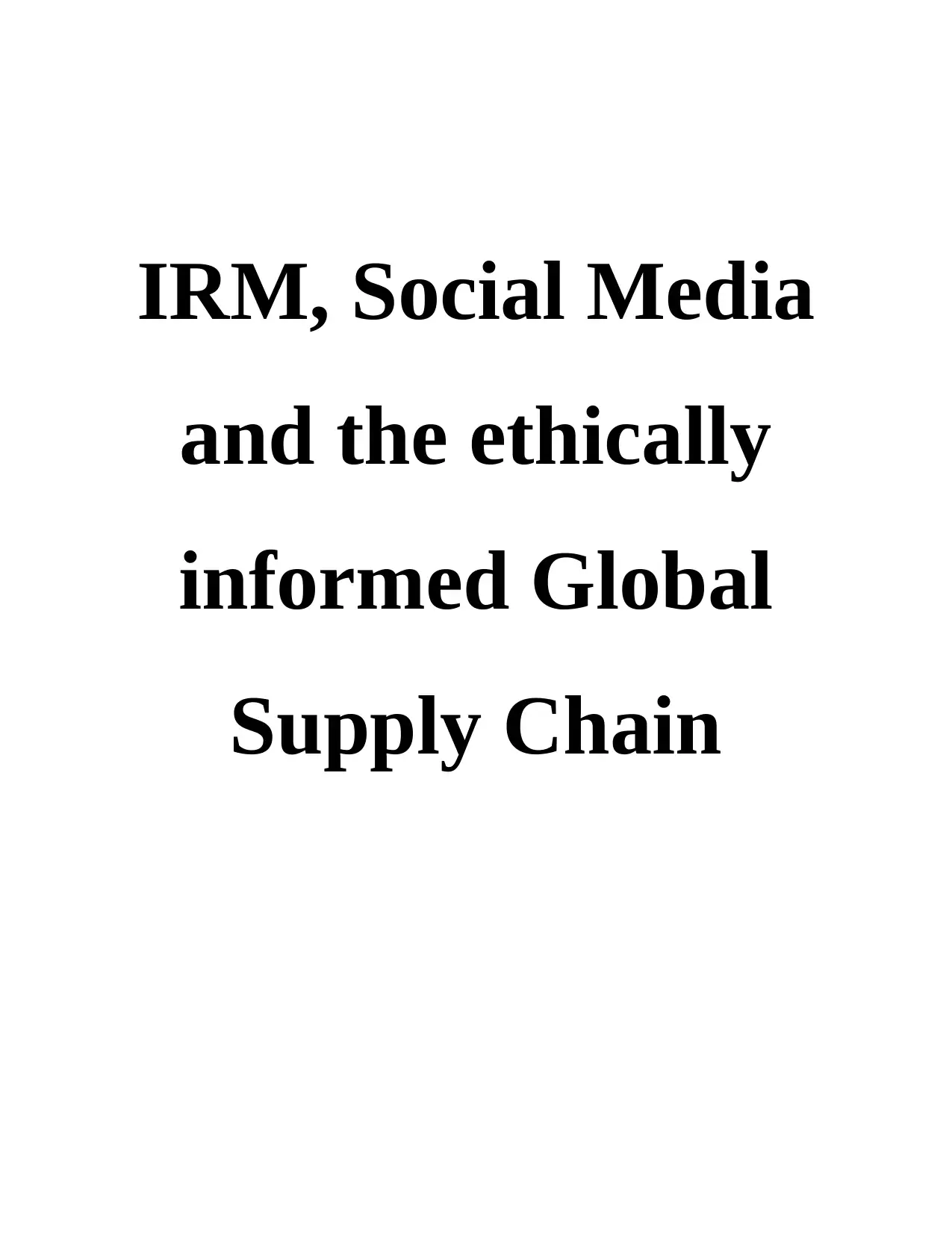
IRM, Social Media
and the ethically
informed Global
Supply Chain
and the ethically
informed Global
Supply Chain
Paraphrase This Document
Need a fresh take? Get an instant paraphrase of this document with our AI Paraphraser
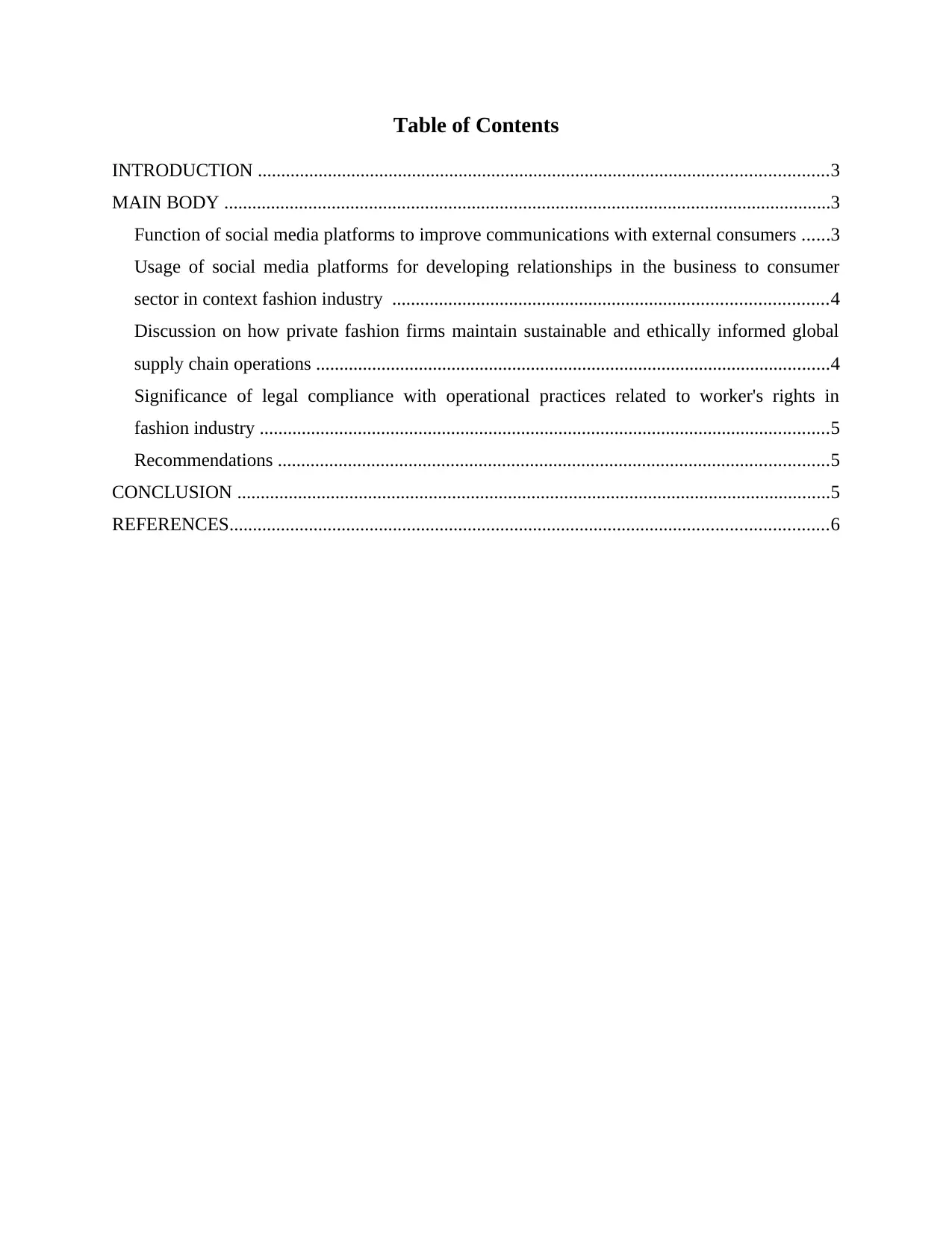
Table of Contents
INTRODUCTION ..........................................................................................................................3
MAIN BODY ..................................................................................................................................3
Function of social media platforms to improve communications with external consumers ......3
Usage of social media platforms for developing relationships in the business to consumer
sector in context fashion industry .............................................................................................4
Discussion on how private fashion firms maintain sustainable and ethically informed global
supply chain operations ..............................................................................................................4
Significance of legal compliance with operational practices related to worker's rights in
fashion industry ..........................................................................................................................5
Recommendations ......................................................................................................................5
CONCLUSION ...............................................................................................................................5
REFERENCES................................................................................................................................6
INTRODUCTION ..........................................................................................................................3
MAIN BODY ..................................................................................................................................3
Function of social media platforms to improve communications with external consumers ......3
Usage of social media platforms for developing relationships in the business to consumer
sector in context fashion industry .............................................................................................4
Discussion on how private fashion firms maintain sustainable and ethically informed global
supply chain operations ..............................................................................................................4
Significance of legal compliance with operational practices related to worker's rights in
fashion industry ..........................................................................................................................5
Recommendations ......................................................................................................................5
CONCLUSION ...............................................................................................................................5
REFERENCES................................................................................................................................6
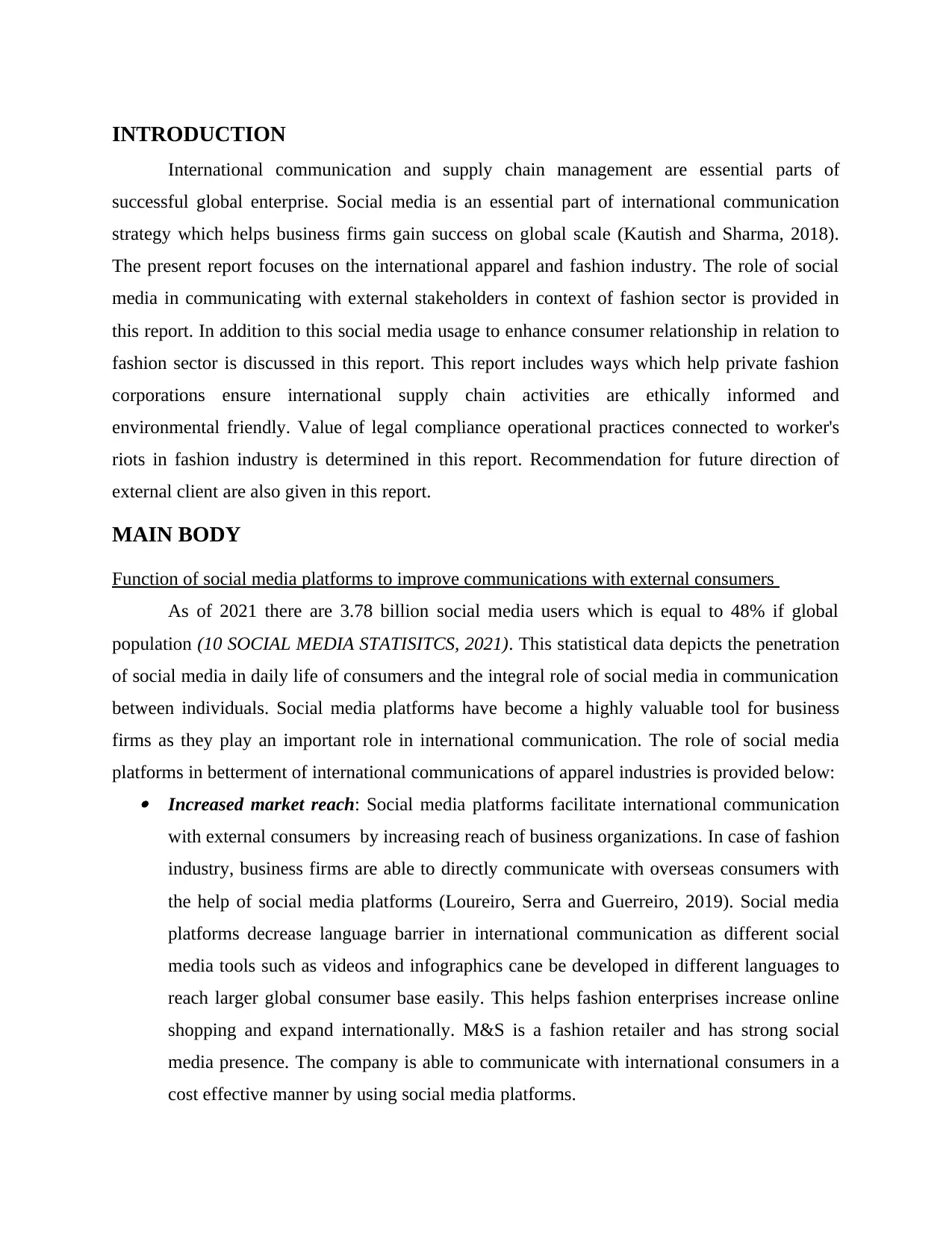
INTRODUCTION
International communication and supply chain management are essential parts of
successful global enterprise. Social media is an essential part of international communication
strategy which helps business firms gain success on global scale (Kautish and Sharma, 2018).
The present report focuses on the international apparel and fashion industry. The role of social
media in communicating with external stakeholders in context of fashion sector is provided in
this report. In addition to this social media usage to enhance consumer relationship in relation to
fashion sector is discussed in this report. This report includes ways which help private fashion
corporations ensure international supply chain activities are ethically informed and
environmental friendly. Value of legal compliance operational practices connected to worker's
riots in fashion industry is determined in this report. Recommendation for future direction of
external client are also given in this report.
MAIN BODY
Function of social media platforms to improve communications with external consumers
As of 2021 there are 3.78 billion social media users which is equal to 48% if global
population (10 SOCIAL MEDIA STATISITCS, 2021). This statistical data depicts the penetration
of social media in daily life of consumers and the integral role of social media in communication
between individuals. Social media platforms have become a highly valuable tool for business
firms as they play an important role in international communication. The role of social media
platforms in betterment of international communications of apparel industries is provided below: Increased market reach: Social media platforms facilitate international communication
with external consumers by increasing reach of business organizations. In case of fashion
industry, business firms are able to directly communicate with overseas consumers with
the help of social media platforms (Loureiro, Serra and Guerreiro, 2019). Social media
platforms decrease language barrier in international communication as different social
media tools such as videos and infographics cane be developed in different languages to
reach larger global consumer base easily. This helps fashion enterprises increase online
shopping and expand internationally. M&S is a fashion retailer and has strong social
media presence. The company is able to communicate with international consumers in a
cost effective manner by using social media platforms.
International communication and supply chain management are essential parts of
successful global enterprise. Social media is an essential part of international communication
strategy which helps business firms gain success on global scale (Kautish and Sharma, 2018).
The present report focuses on the international apparel and fashion industry. The role of social
media in communicating with external stakeholders in context of fashion sector is provided in
this report. In addition to this social media usage to enhance consumer relationship in relation to
fashion sector is discussed in this report. This report includes ways which help private fashion
corporations ensure international supply chain activities are ethically informed and
environmental friendly. Value of legal compliance operational practices connected to worker's
riots in fashion industry is determined in this report. Recommendation for future direction of
external client are also given in this report.
MAIN BODY
Function of social media platforms to improve communications with external consumers
As of 2021 there are 3.78 billion social media users which is equal to 48% if global
population (10 SOCIAL MEDIA STATISITCS, 2021). This statistical data depicts the penetration
of social media in daily life of consumers and the integral role of social media in communication
between individuals. Social media platforms have become a highly valuable tool for business
firms as they play an important role in international communication. The role of social media
platforms in betterment of international communications of apparel industries is provided below: Increased market reach: Social media platforms facilitate international communication
with external consumers by increasing reach of business organizations. In case of fashion
industry, business firms are able to directly communicate with overseas consumers with
the help of social media platforms (Loureiro, Serra and Guerreiro, 2019). Social media
platforms decrease language barrier in international communication as different social
media tools such as videos and infographics cane be developed in different languages to
reach larger global consumer base easily. This helps fashion enterprises increase online
shopping and expand internationally. M&S is a fashion retailer and has strong social
media presence. The company is able to communicate with international consumers in a
cost effective manner by using social media platforms.
⊘ This is a preview!⊘
Do you want full access?
Subscribe today to unlock all pages.

Trusted by 1+ million students worldwide
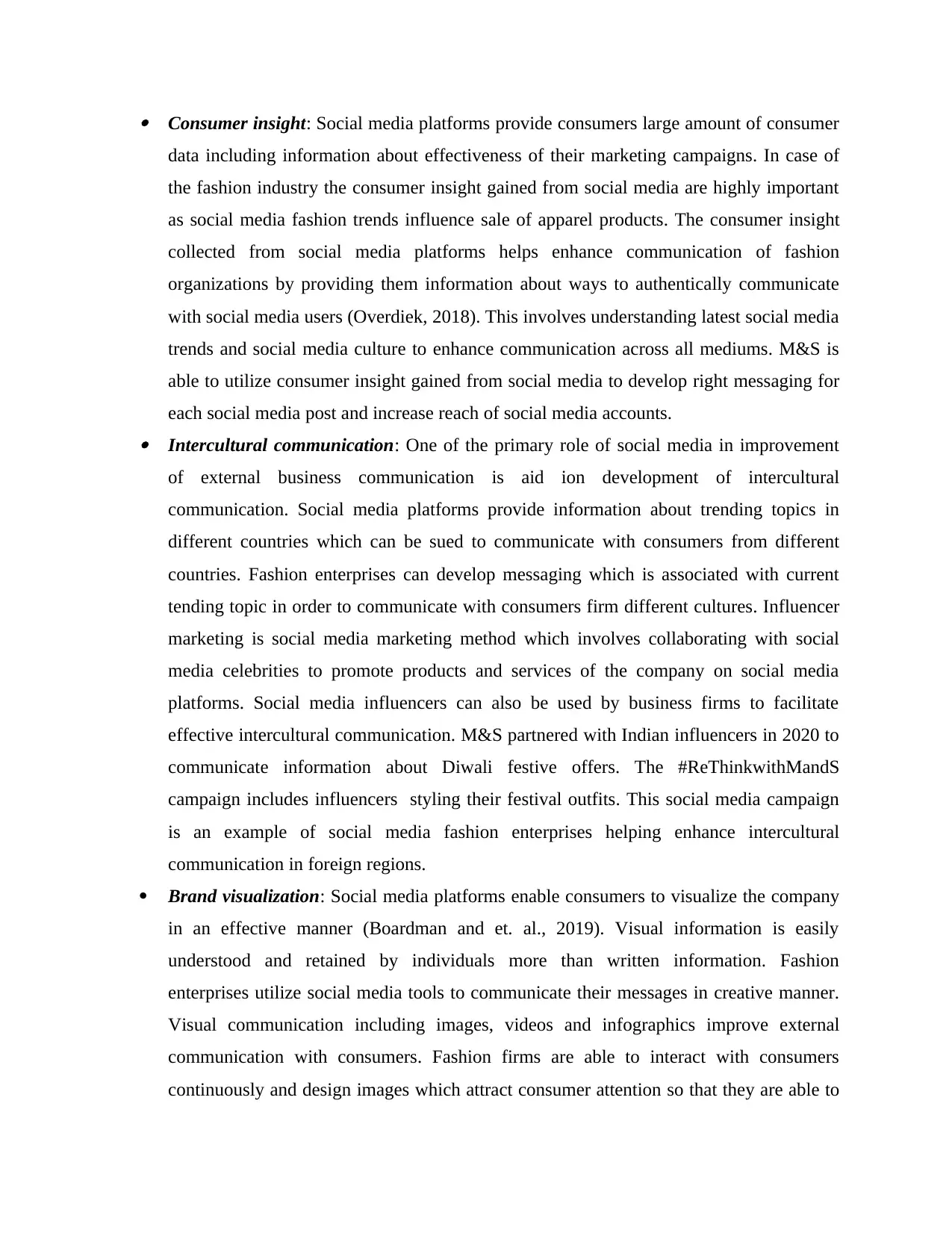
Consumer insight: Social media platforms provide consumers large amount of consumer
data including information about effectiveness of their marketing campaigns. In case of
the fashion industry the consumer insight gained from social media are highly important
as social media fashion trends influence sale of apparel products. The consumer insight
collected from social media platforms helps enhance communication of fashion
organizations by providing them information about ways to authentically communicate
with social media users (Overdiek, 2018). This involves understanding latest social media
trends and social media culture to enhance communication across all mediums. M&S is
able to utilize consumer insight gained from social media to develop right messaging for
each social media post and increase reach of social media accounts. Intercultural communication: One of the primary role of social media in improvement
of external business communication is aid ion development of intercultural
communication. Social media platforms provide information about trending topics in
different countries which can be sued to communicate with consumers from different
countries. Fashion enterprises can develop messaging which is associated with current
tending topic in order to communicate with consumers firm different cultures. Influencer
marketing is social media marketing method which involves collaborating with social
media celebrities to promote products and services of the company on social media
platforms. Social media influencers can also be used by business firms to facilitate
effective intercultural communication. M&S partnered with Indian influencers in 2020 to
communicate information about Diwali festive offers. The #ReThinkwithMandS
campaign includes influencers styling their festival outfits. This social media campaign
is an example of social media fashion enterprises helping enhance intercultural
communication in foreign regions.
Brand visualization: Social media platforms enable consumers to visualize the company
in an effective manner (Boardman and et. al., 2019). Visual information is easily
understood and retained by individuals more than written information. Fashion
enterprises utilize social media tools to communicate their messages in creative manner.
Visual communication including images, videos and infographics improve external
communication with consumers. Fashion firms are able to interact with consumers
continuously and design images which attract consumer attention so that they are able to
data including information about effectiveness of their marketing campaigns. In case of
the fashion industry the consumer insight gained from social media are highly important
as social media fashion trends influence sale of apparel products. The consumer insight
collected from social media platforms helps enhance communication of fashion
organizations by providing them information about ways to authentically communicate
with social media users (Overdiek, 2018). This involves understanding latest social media
trends and social media culture to enhance communication across all mediums. M&S is
able to utilize consumer insight gained from social media to develop right messaging for
each social media post and increase reach of social media accounts. Intercultural communication: One of the primary role of social media in improvement
of external business communication is aid ion development of intercultural
communication. Social media platforms provide information about trending topics in
different countries which can be sued to communicate with consumers from different
countries. Fashion enterprises can develop messaging which is associated with current
tending topic in order to communicate with consumers firm different cultures. Influencer
marketing is social media marketing method which involves collaborating with social
media celebrities to promote products and services of the company on social media
platforms. Social media influencers can also be used by business firms to facilitate
effective intercultural communication. M&S partnered with Indian influencers in 2020 to
communicate information about Diwali festive offers. The #ReThinkwithMandS
campaign includes influencers styling their festival outfits. This social media campaign
is an example of social media fashion enterprises helping enhance intercultural
communication in foreign regions.
Brand visualization: Social media platforms enable consumers to visualize the company
in an effective manner (Boardman and et. al., 2019). Visual information is easily
understood and retained by individuals more than written information. Fashion
enterprises utilize social media tools to communicate their messages in creative manner.
Visual communication including images, videos and infographics improve external
communication with consumers. Fashion firms are able to interact with consumers
continuously and design images which attract consumer attention so that they are able to
Paraphrase This Document
Need a fresh take? Get an instant paraphrase of this document with our AI Paraphraser
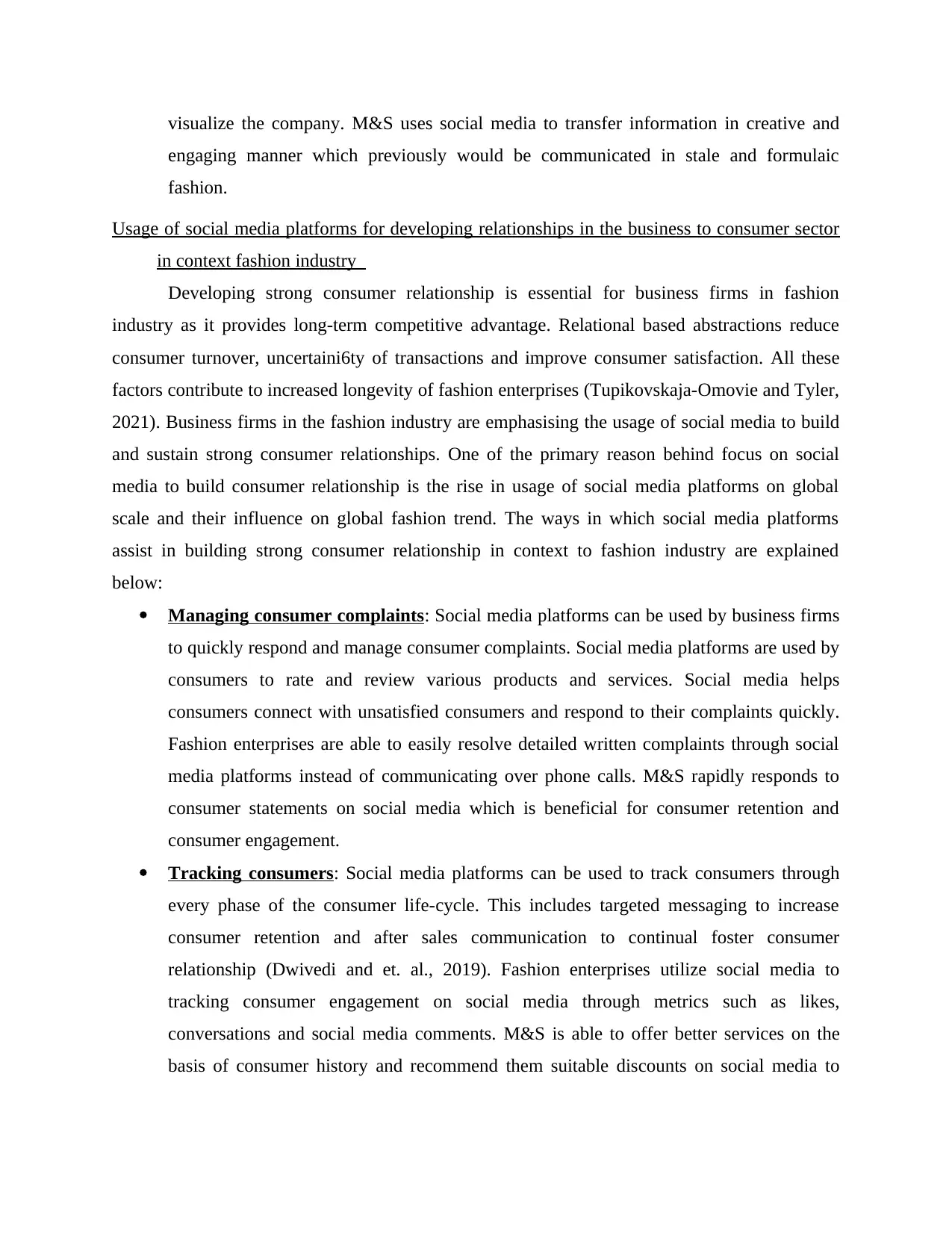
visualize the company. M&S uses social media to transfer information in creative and
engaging manner which previously would be communicated in stale and formulaic
fashion.
Usage of social media platforms for developing relationships in the business to consumer sector
in context fashion industry
Developing strong consumer relationship is essential for business firms in fashion
industry as it provides long-term competitive advantage. Relational based abstractions reduce
consumer turnover, uncertaini6ty of transactions and improve consumer satisfaction. All these
factors contribute to increased longevity of fashion enterprises (Tupikovskaja-Omovie and Tyler,
2021). Business firms in the fashion industry are emphasising the usage of social media to build
and sustain strong consumer relationships. One of the primary reason behind focus on social
media to build consumer relationship is the rise in usage of social media platforms on global
scale and their influence on global fashion trend. The ways in which social media platforms
assist in building strong consumer relationship in context to fashion industry are explained
below:
Managing consumer complaints: Social media platforms can be used by business firms
to quickly respond and manage consumer complaints. Social media platforms are used by
consumers to rate and review various products and services. Social media helps
consumers connect with unsatisfied consumers and respond to their complaints quickly.
Fashion enterprises are able to easily resolve detailed written complaints through social
media platforms instead of communicating over phone calls. M&S rapidly responds to
consumer statements on social media which is beneficial for consumer retention and
consumer engagement.
Tracking consumers: Social media platforms can be used to track consumers through
every phase of the consumer life-cycle. This includes targeted messaging to increase
consumer retention and after sales communication to continual foster consumer
relationship (Dwivedi and et. al., 2019). Fashion enterprises utilize social media to
tracking consumer engagement on social media through metrics such as likes,
conversations and social media comments. M&S is able to offer better services on the
basis of consumer history and recommend them suitable discounts on social media to
engaging manner which previously would be communicated in stale and formulaic
fashion.
Usage of social media platforms for developing relationships in the business to consumer sector
in context fashion industry
Developing strong consumer relationship is essential for business firms in fashion
industry as it provides long-term competitive advantage. Relational based abstractions reduce
consumer turnover, uncertaini6ty of transactions and improve consumer satisfaction. All these
factors contribute to increased longevity of fashion enterprises (Tupikovskaja-Omovie and Tyler,
2021). Business firms in the fashion industry are emphasising the usage of social media to build
and sustain strong consumer relationships. One of the primary reason behind focus on social
media to build consumer relationship is the rise in usage of social media platforms on global
scale and their influence on global fashion trend. The ways in which social media platforms
assist in building strong consumer relationship in context to fashion industry are explained
below:
Managing consumer complaints: Social media platforms can be used by business firms
to quickly respond and manage consumer complaints. Social media platforms are used by
consumers to rate and review various products and services. Social media helps
consumers connect with unsatisfied consumers and respond to their complaints quickly.
Fashion enterprises are able to easily resolve detailed written complaints through social
media platforms instead of communicating over phone calls. M&S rapidly responds to
consumer statements on social media which is beneficial for consumer retention and
consumer engagement.
Tracking consumers: Social media platforms can be used to track consumers through
every phase of the consumer life-cycle. This includes targeted messaging to increase
consumer retention and after sales communication to continual foster consumer
relationship (Dwivedi and et. al., 2019). Fashion enterprises utilize social media to
tracking consumer engagement on social media through metrics such as likes,
conversations and social media comments. M&S is able to offer better services on the
basis of consumer history and recommend them suitable discounts on social media to
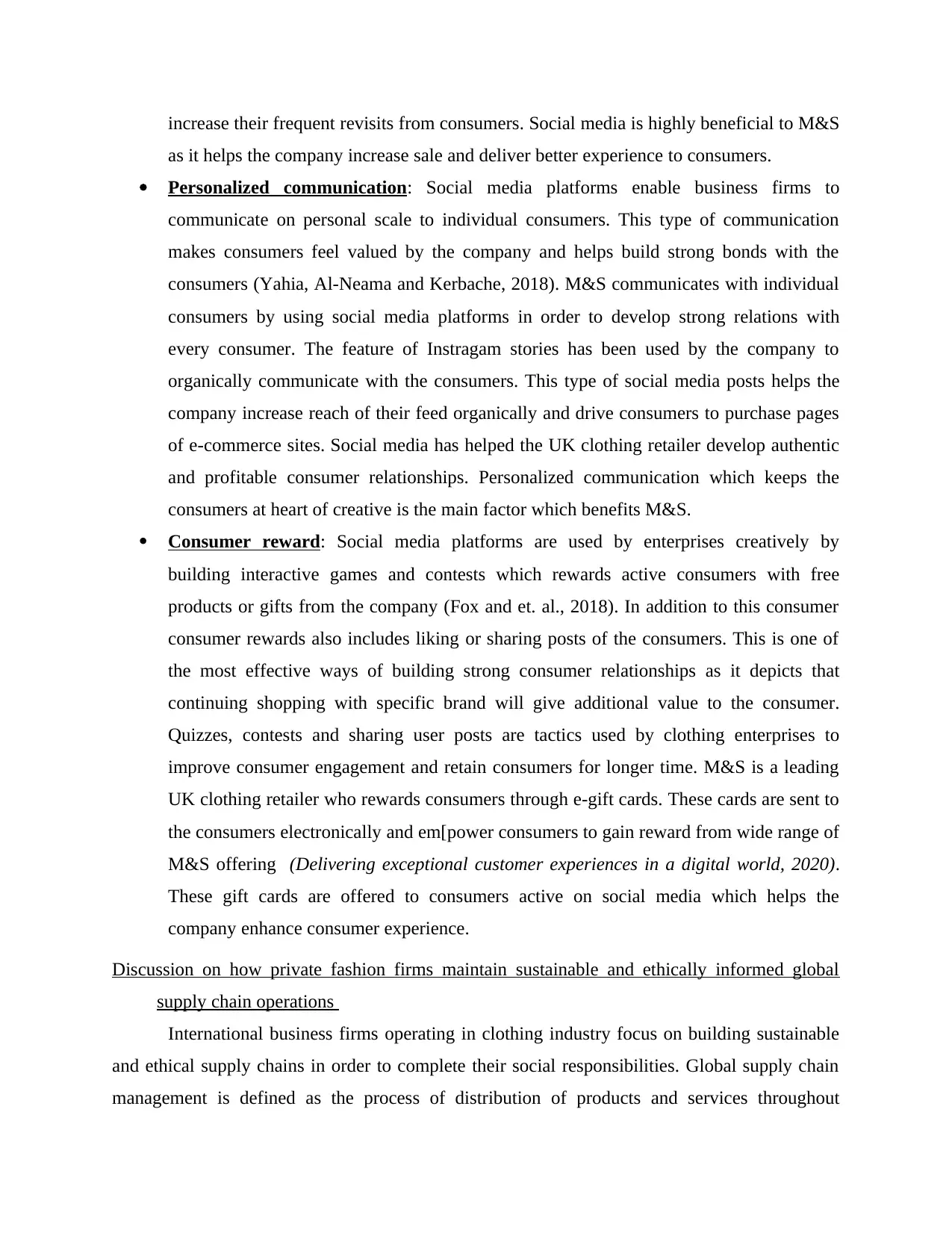
increase their frequent revisits from consumers. Social media is highly beneficial to M&S
as it helps the company increase sale and deliver better experience to consumers.
Personalized communication: Social media platforms enable business firms to
communicate on personal scale to individual consumers. This type of communication
makes consumers feel valued by the company and helps build strong bonds with the
consumers (Yahia, Al-Neama and Kerbache, 2018). M&S communicates with individual
consumers by using social media platforms in order to develop strong relations with
every consumer. The feature of Instragam stories has been used by the company to
organically communicate with the consumers. This type of social media posts helps the
company increase reach of their feed organically and drive consumers to purchase pages
of e-commerce sites. Social media has helped the UK clothing retailer develop authentic
and profitable consumer relationships. Personalized communication which keeps the
consumers at heart of creative is the main factor which benefits M&S.
Consumer reward: Social media platforms are used by enterprises creatively by
building interactive games and contests which rewards active consumers with free
products or gifts from the company (Fox and et. al., 2018). In addition to this consumer
consumer rewards also includes liking or sharing posts of the consumers. This is one of
the most effective ways of building strong consumer relationships as it depicts that
continuing shopping with specific brand will give additional value to the consumer.
Quizzes, contests and sharing user posts are tactics used by clothing enterprises to
improve consumer engagement and retain consumers for longer time. M&S is a leading
UK clothing retailer who rewards consumers through e-gift cards. These cards are sent to
the consumers electronically and em[power consumers to gain reward from wide range of
M&S offering (Delivering exceptional customer experiences in a digital world, 2020).
These gift cards are offered to consumers active on social media which helps the
company enhance consumer experience.
Discussion on how private fashion firms maintain sustainable and ethically informed global
supply chain operations
International business firms operating in clothing industry focus on building sustainable
and ethical supply chains in order to complete their social responsibilities. Global supply chain
management is defined as the process of distribution of products and services throughout
as it helps the company increase sale and deliver better experience to consumers.
Personalized communication: Social media platforms enable business firms to
communicate on personal scale to individual consumers. This type of communication
makes consumers feel valued by the company and helps build strong bonds with the
consumers (Yahia, Al-Neama and Kerbache, 2018). M&S communicates with individual
consumers by using social media platforms in order to develop strong relations with
every consumer. The feature of Instragam stories has been used by the company to
organically communicate with the consumers. This type of social media posts helps the
company increase reach of their feed organically and drive consumers to purchase pages
of e-commerce sites. Social media has helped the UK clothing retailer develop authentic
and profitable consumer relationships. Personalized communication which keeps the
consumers at heart of creative is the main factor which benefits M&S.
Consumer reward: Social media platforms are used by enterprises creatively by
building interactive games and contests which rewards active consumers with free
products or gifts from the company (Fox and et. al., 2018). In addition to this consumer
consumer rewards also includes liking or sharing posts of the consumers. This is one of
the most effective ways of building strong consumer relationships as it depicts that
continuing shopping with specific brand will give additional value to the consumer.
Quizzes, contests and sharing user posts are tactics used by clothing enterprises to
improve consumer engagement and retain consumers for longer time. M&S is a leading
UK clothing retailer who rewards consumers through e-gift cards. These cards are sent to
the consumers electronically and em[power consumers to gain reward from wide range of
M&S offering (Delivering exceptional customer experiences in a digital world, 2020).
These gift cards are offered to consumers active on social media which helps the
company enhance consumer experience.
Discussion on how private fashion firms maintain sustainable and ethically informed global
supply chain operations
International business firms operating in clothing industry focus on building sustainable
and ethical supply chains in order to complete their social responsibilities. Global supply chain
management is defined as the process of distribution of products and services throughout
⊘ This is a preview!⊘
Do you want full access?
Subscribe today to unlock all pages.

Trusted by 1+ million students worldwide
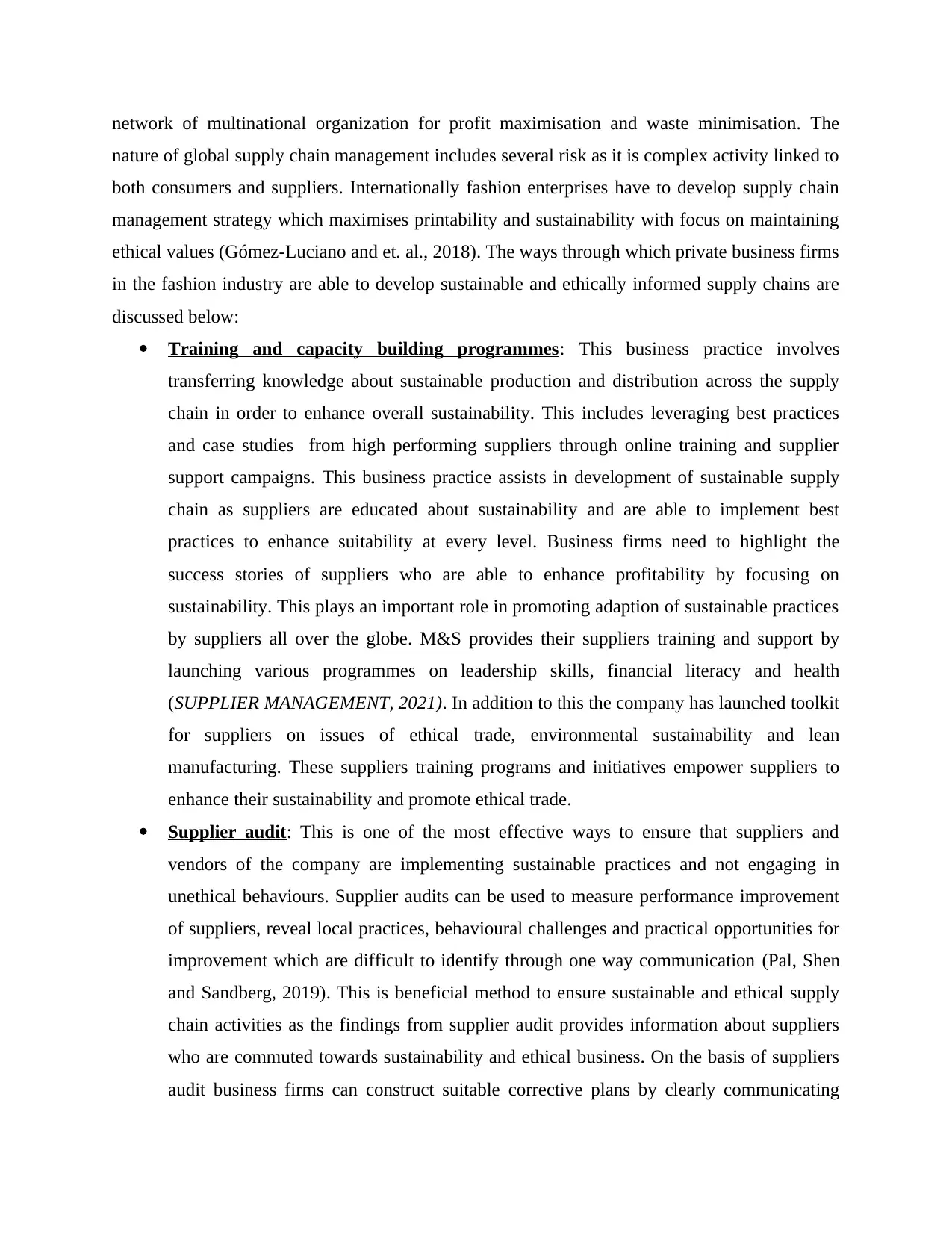
network of multinational organization for profit maximisation and waste minimisation. The
nature of global supply chain management includes several risk as it is complex activity linked to
both consumers and suppliers. Internationally fashion enterprises have to develop supply chain
management strategy which maximises printability and sustainability with focus on maintaining
ethical values (Gómez-Luciano and et. al., 2018). The ways through which private business firms
in the fashion industry are able to develop sustainable and ethically informed supply chains are
discussed below:
Training and capacity building programmes: This business practice involves
transferring knowledge about sustainable production and distribution across the supply
chain in order to enhance overall sustainability. This includes leveraging best practices
and case studies from high performing suppliers through online training and supplier
support campaigns. This business practice assists in development of sustainable supply
chain as suppliers are educated about sustainability and are able to implement best
practices to enhance suitability at every level. Business firms need to highlight the
success stories of suppliers who are able to enhance profitability by focusing on
sustainability. This plays an important role in promoting adaption of sustainable practices
by suppliers all over the globe. M&S provides their suppliers training and support by
launching various programmes on leadership skills, financial literacy and health
(SUPPLIER MANAGEMENT, 2021). In addition to this the company has launched toolkit
for suppliers on issues of ethical trade, environmental sustainability and lean
manufacturing. These suppliers training programs and initiatives empower suppliers to
enhance their sustainability and promote ethical trade.
Supplier audit: This is one of the most effective ways to ensure that suppliers and
vendors of the company are implementing sustainable practices and not engaging in
unethical behaviours. Supplier audits can be used to measure performance improvement
of suppliers, reveal local practices, behavioural challenges and practical opportunities for
improvement which are difficult to identify through one way communication (Pal, Shen
and Sandberg, 2019). This is beneficial method to ensure sustainable and ethical supply
chain activities as the findings from supplier audit provides information about suppliers
who are commuted towards sustainability and ethical business. On the basis of suppliers
audit business firms can construct suitable corrective plans by clearly communicating
nature of global supply chain management includes several risk as it is complex activity linked to
both consumers and suppliers. Internationally fashion enterprises have to develop supply chain
management strategy which maximises printability and sustainability with focus on maintaining
ethical values (Gómez-Luciano and et. al., 2018). The ways through which private business firms
in the fashion industry are able to develop sustainable and ethically informed supply chains are
discussed below:
Training and capacity building programmes: This business practice involves
transferring knowledge about sustainable production and distribution across the supply
chain in order to enhance overall sustainability. This includes leveraging best practices
and case studies from high performing suppliers through online training and supplier
support campaigns. This business practice assists in development of sustainable supply
chain as suppliers are educated about sustainability and are able to implement best
practices to enhance suitability at every level. Business firms need to highlight the
success stories of suppliers who are able to enhance profitability by focusing on
sustainability. This plays an important role in promoting adaption of sustainable practices
by suppliers all over the globe. M&S provides their suppliers training and support by
launching various programmes on leadership skills, financial literacy and health
(SUPPLIER MANAGEMENT, 2021). In addition to this the company has launched toolkit
for suppliers on issues of ethical trade, environmental sustainability and lean
manufacturing. These suppliers training programs and initiatives empower suppliers to
enhance their sustainability and promote ethical trade.
Supplier audit: This is one of the most effective ways to ensure that suppliers and
vendors of the company are implementing sustainable practices and not engaging in
unethical behaviours. Supplier audits can be used to measure performance improvement
of suppliers, reveal local practices, behavioural challenges and practical opportunities for
improvement which are difficult to identify through one way communication (Pal, Shen
and Sandberg, 2019). This is beneficial method to ensure sustainable and ethical supply
chain activities as the findings from supplier audit provides information about suppliers
who are commuted towards sustainability and ethical business. On the basis of suppliers
audit business firms can construct suitable corrective plans by clearly communicating
Paraphrase This Document
Need a fresh take? Get an instant paraphrase of this document with our AI Paraphraser
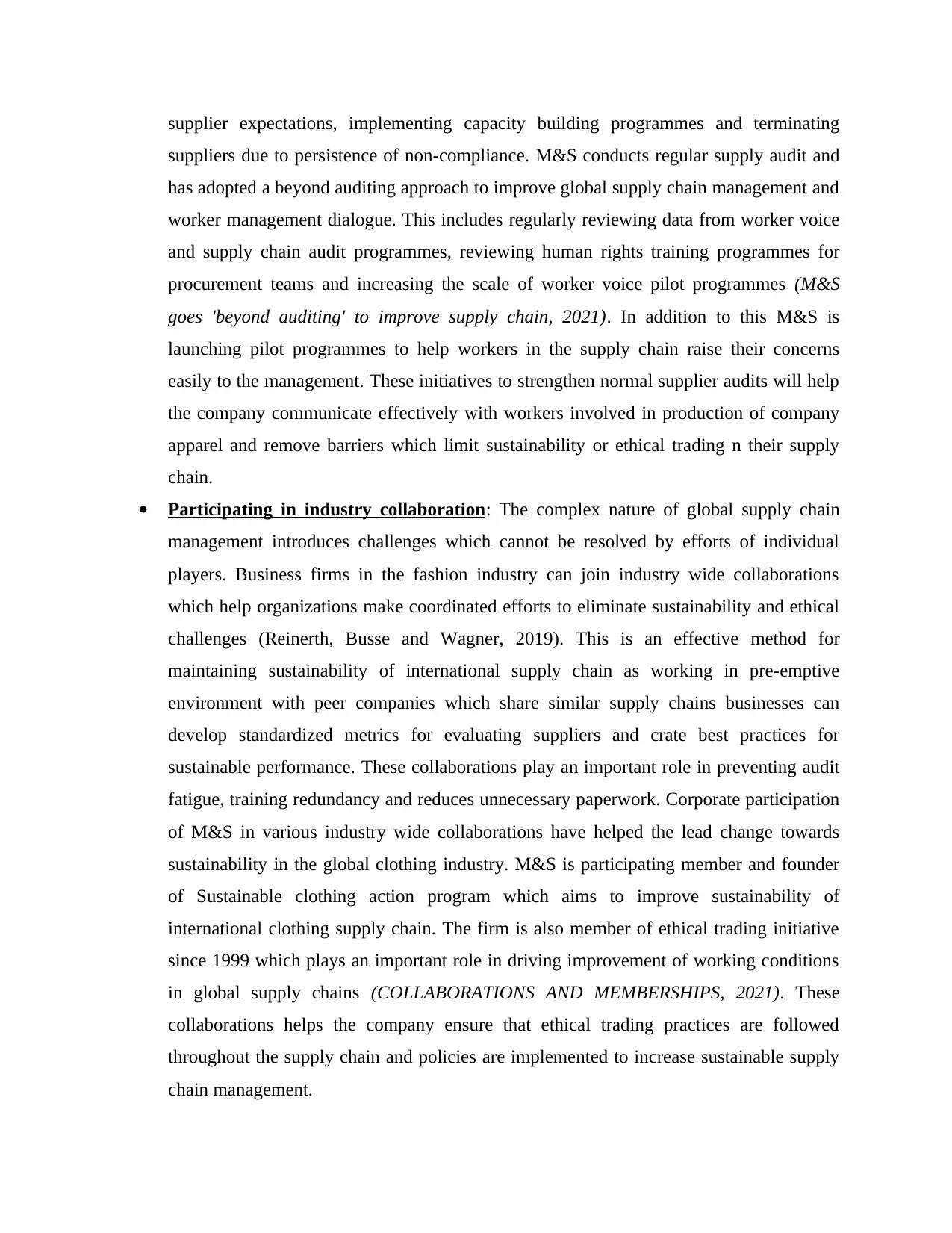
supplier expectations, implementing capacity building programmes and terminating
suppliers due to persistence of non-compliance. M&S conducts regular supply audit and
has adopted a beyond auditing approach to improve global supply chain management and
worker management dialogue. This includes regularly reviewing data from worker voice
and supply chain audit programmes, reviewing human rights training programmes for
procurement teams and increasing the scale of worker voice pilot programmes (M&S
goes 'beyond auditing' to improve supply chain, 2021). In addition to this M&S is
launching pilot programmes to help workers in the supply chain raise their concerns
easily to the management. These initiatives to strengthen normal supplier audits will help
the company communicate effectively with workers involved in production of company
apparel and remove barriers which limit sustainability or ethical trading n their supply
chain.
Participating in industry collaboration: The complex nature of global supply chain
management introduces challenges which cannot be resolved by efforts of individual
players. Business firms in the fashion industry can join industry wide collaborations
which help organizations make coordinated efforts to eliminate sustainability and ethical
challenges (Reinerth, Busse and Wagner, 2019). This is an effective method for
maintaining sustainability of international supply chain as working in pre-emptive
environment with peer companies which share similar supply chains businesses can
develop standardized metrics for evaluating suppliers and crate best practices for
sustainable performance. These collaborations play an important role in preventing audit
fatigue, training redundancy and reduces unnecessary paperwork. Corporate participation
of M&S in various industry wide collaborations have helped the lead change towards
sustainability in the global clothing industry. M&S is participating member and founder
of Sustainable clothing action program which aims to improve sustainability of
international clothing supply chain. The firm is also member of ethical trading initiative
since 1999 which plays an important role in driving improvement of working conditions
in global supply chains (COLLABORATIONS AND MEMBERSHIPS, 2021). These
collaborations helps the company ensure that ethical trading practices are followed
throughout the supply chain and policies are implemented to increase sustainable supply
chain management.
suppliers due to persistence of non-compliance. M&S conducts regular supply audit and
has adopted a beyond auditing approach to improve global supply chain management and
worker management dialogue. This includes regularly reviewing data from worker voice
and supply chain audit programmes, reviewing human rights training programmes for
procurement teams and increasing the scale of worker voice pilot programmes (M&S
goes 'beyond auditing' to improve supply chain, 2021). In addition to this M&S is
launching pilot programmes to help workers in the supply chain raise their concerns
easily to the management. These initiatives to strengthen normal supplier audits will help
the company communicate effectively with workers involved in production of company
apparel and remove barriers which limit sustainability or ethical trading n their supply
chain.
Participating in industry collaboration: The complex nature of global supply chain
management introduces challenges which cannot be resolved by efforts of individual
players. Business firms in the fashion industry can join industry wide collaborations
which help organizations make coordinated efforts to eliminate sustainability and ethical
challenges (Reinerth, Busse and Wagner, 2019). This is an effective method for
maintaining sustainability of international supply chain as working in pre-emptive
environment with peer companies which share similar supply chains businesses can
develop standardized metrics for evaluating suppliers and crate best practices for
sustainable performance. These collaborations play an important role in preventing audit
fatigue, training redundancy and reduces unnecessary paperwork. Corporate participation
of M&S in various industry wide collaborations have helped the lead change towards
sustainability in the global clothing industry. M&S is participating member and founder
of Sustainable clothing action program which aims to improve sustainability of
international clothing supply chain. The firm is also member of ethical trading initiative
since 1999 which plays an important role in driving improvement of working conditions
in global supply chains (COLLABORATIONS AND MEMBERSHIPS, 2021). These
collaborations helps the company ensure that ethical trading practices are followed
throughout the supply chain and policies are implemented to increase sustainable supply
chain management.
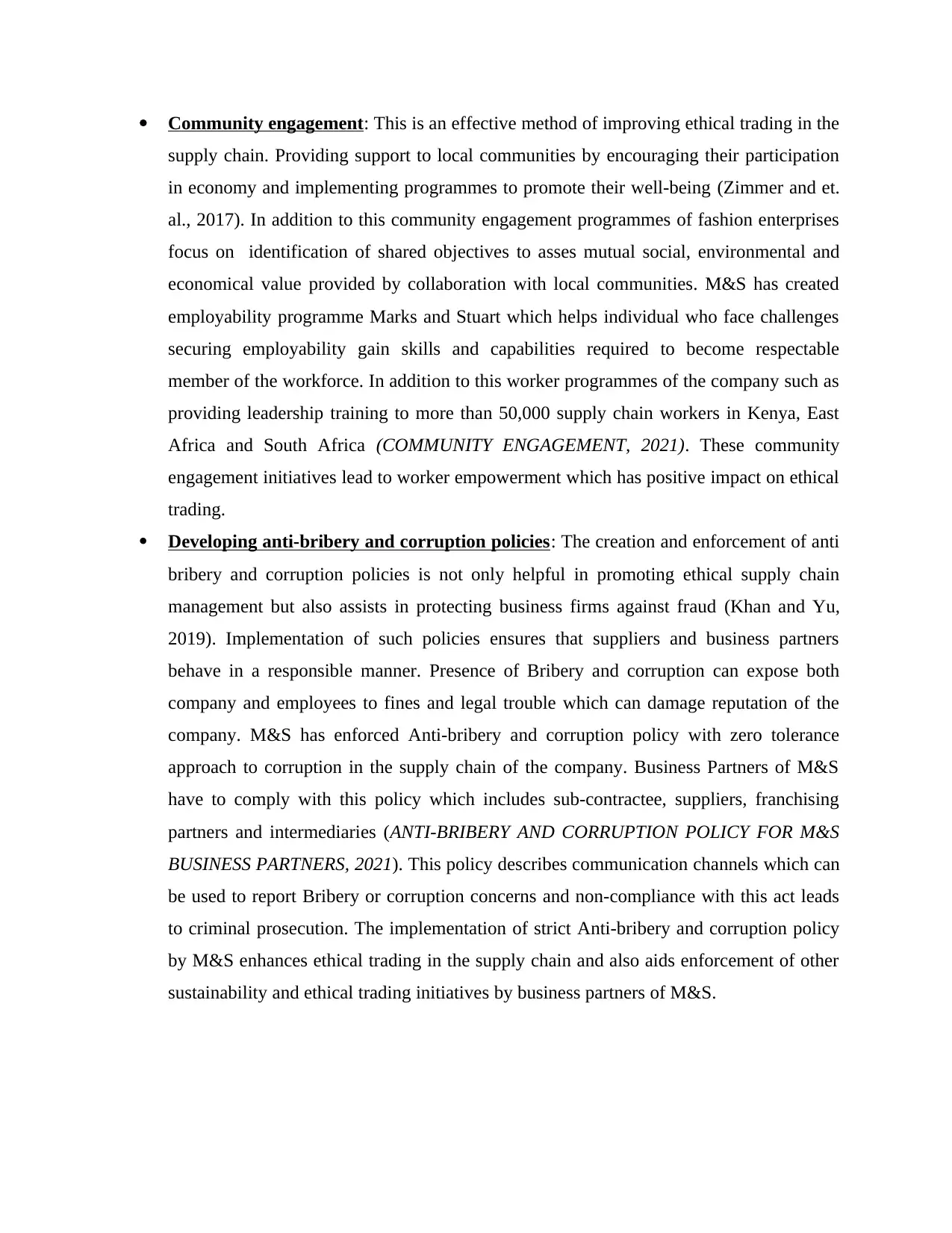
Community engagement: This is an effective method of improving ethical trading in the
supply chain. Providing support to local communities by encouraging their participation
in economy and implementing programmes to promote their well-being (Zimmer and et.
al., 2017). In addition to this community engagement programmes of fashion enterprises
focus on identification of shared objectives to asses mutual social, environmental and
economical value provided by collaboration with local communities. M&S has created
employability programme Marks and Stuart which helps individual who face challenges
securing employability gain skills and capabilities required to become respectable
member of the workforce. In addition to this worker programmes of the company such as
providing leadership training to more than 50,000 supply chain workers in Kenya, East
Africa and South Africa (COMMUNITY ENGAGEMENT, 2021). These community
engagement initiatives lead to worker empowerment which has positive impact on ethical
trading.
Developing anti-bribery and corruption policies: The creation and enforcement of anti
bribery and corruption policies is not only helpful in promoting ethical supply chain
management but also assists in protecting business firms against fraud (Khan and Yu,
2019). Implementation of such policies ensures that suppliers and business partners
behave in a responsible manner. Presence of Bribery and corruption can expose both
company and employees to fines and legal trouble which can damage reputation of the
company. M&S has enforced Anti-bribery and corruption policy with zero tolerance
approach to corruption in the supply chain of the company. Business Partners of M&S
have to comply with this policy which includes sub-contractee, suppliers, franchising
partners and intermediaries (ANTI-BRIBERY AND CORRUPTION POLICY FOR M&S
BUSINESS PARTNERS, 2021). This policy describes communication channels which can
be used to report Bribery or corruption concerns and non-compliance with this act leads
to criminal prosecution. The implementation of strict Anti-bribery and corruption policy
by M&S enhances ethical trading in the supply chain and also aids enforcement of other
sustainability and ethical trading initiatives by business partners of M&S.
supply chain. Providing support to local communities by encouraging their participation
in economy and implementing programmes to promote their well-being (Zimmer and et.
al., 2017). In addition to this community engagement programmes of fashion enterprises
focus on identification of shared objectives to asses mutual social, environmental and
economical value provided by collaboration with local communities. M&S has created
employability programme Marks and Stuart which helps individual who face challenges
securing employability gain skills and capabilities required to become respectable
member of the workforce. In addition to this worker programmes of the company such as
providing leadership training to more than 50,000 supply chain workers in Kenya, East
Africa and South Africa (COMMUNITY ENGAGEMENT, 2021). These community
engagement initiatives lead to worker empowerment which has positive impact on ethical
trading.
Developing anti-bribery and corruption policies: The creation and enforcement of anti
bribery and corruption policies is not only helpful in promoting ethical supply chain
management but also assists in protecting business firms against fraud (Khan and Yu,
2019). Implementation of such policies ensures that suppliers and business partners
behave in a responsible manner. Presence of Bribery and corruption can expose both
company and employees to fines and legal trouble which can damage reputation of the
company. M&S has enforced Anti-bribery and corruption policy with zero tolerance
approach to corruption in the supply chain of the company. Business Partners of M&S
have to comply with this policy which includes sub-contractee, suppliers, franchising
partners and intermediaries (ANTI-BRIBERY AND CORRUPTION POLICY FOR M&S
BUSINESS PARTNERS, 2021). This policy describes communication channels which can
be used to report Bribery or corruption concerns and non-compliance with this act leads
to criminal prosecution. The implementation of strict Anti-bribery and corruption policy
by M&S enhances ethical trading in the supply chain and also aids enforcement of other
sustainability and ethical trading initiatives by business partners of M&S.
⊘ This is a preview!⊘
Do you want full access?
Subscribe today to unlock all pages.

Trusted by 1+ million students worldwide
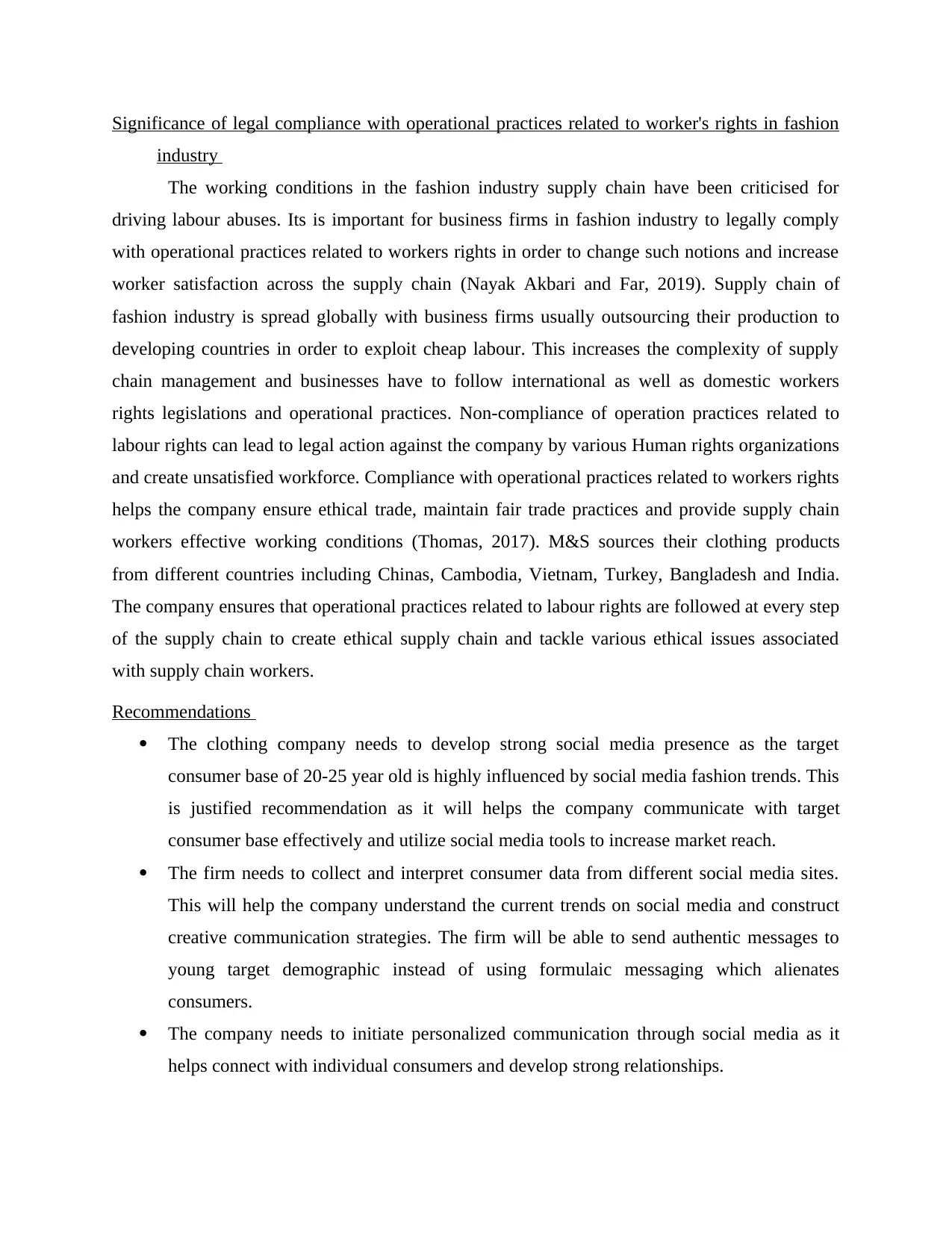
Significance of legal compliance with operational practices related to worker's rights in fashion
industry
The working conditions in the fashion industry supply chain have been criticised for
driving labour abuses. Its is important for business firms in fashion industry to legally comply
with operational practices related to workers rights in order to change such notions and increase
worker satisfaction across the supply chain (Nayak Akbari and Far, 2019). Supply chain of
fashion industry is spread globally with business firms usually outsourcing their production to
developing countries in order to exploit cheap labour. This increases the complexity of supply
chain management and businesses have to follow international as well as domestic workers
rights legislations and operational practices. Non-compliance of operation practices related to
labour rights can lead to legal action against the company by various Human rights organizations
and create unsatisfied workforce. Compliance with operational practices related to workers rights
helps the company ensure ethical trade, maintain fair trade practices and provide supply chain
workers effective working conditions (Thomas, 2017). M&S sources their clothing products
from different countries including Chinas, Cambodia, Vietnam, Turkey, Bangladesh and India.
The company ensures that operational practices related to labour rights are followed at every step
of the supply chain to create ethical supply chain and tackle various ethical issues associated
with supply chain workers.
Recommendations
The clothing company needs to develop strong social media presence as the target
consumer base of 20-25 year old is highly influenced by social media fashion trends. This
is justified recommendation as it will helps the company communicate with target
consumer base effectively and utilize social media tools to increase market reach.
The firm needs to collect and interpret consumer data from different social media sites.
This will help the company understand the current trends on social media and construct
creative communication strategies. The firm will be able to send authentic messages to
young target demographic instead of using formulaic messaging which alienates
consumers.
The company needs to initiate personalized communication through social media as it
helps connect with individual consumers and develop strong relationships.
industry
The working conditions in the fashion industry supply chain have been criticised for
driving labour abuses. Its is important for business firms in fashion industry to legally comply
with operational practices related to workers rights in order to change such notions and increase
worker satisfaction across the supply chain (Nayak Akbari and Far, 2019). Supply chain of
fashion industry is spread globally with business firms usually outsourcing their production to
developing countries in order to exploit cheap labour. This increases the complexity of supply
chain management and businesses have to follow international as well as domestic workers
rights legislations and operational practices. Non-compliance of operation practices related to
labour rights can lead to legal action against the company by various Human rights organizations
and create unsatisfied workforce. Compliance with operational practices related to workers rights
helps the company ensure ethical trade, maintain fair trade practices and provide supply chain
workers effective working conditions (Thomas, 2017). M&S sources their clothing products
from different countries including Chinas, Cambodia, Vietnam, Turkey, Bangladesh and India.
The company ensures that operational practices related to labour rights are followed at every step
of the supply chain to create ethical supply chain and tackle various ethical issues associated
with supply chain workers.
Recommendations
The clothing company needs to develop strong social media presence as the target
consumer base of 20-25 year old is highly influenced by social media fashion trends. This
is justified recommendation as it will helps the company communicate with target
consumer base effectively and utilize social media tools to increase market reach.
The firm needs to collect and interpret consumer data from different social media sites.
This will help the company understand the current trends on social media and construct
creative communication strategies. The firm will be able to send authentic messages to
young target demographic instead of using formulaic messaging which alienates
consumers.
The company needs to initiate personalized communication through social media as it
helps connect with individual consumers and develop strong relationships.
Paraphrase This Document
Need a fresh take? Get an instant paraphrase of this document with our AI Paraphraser
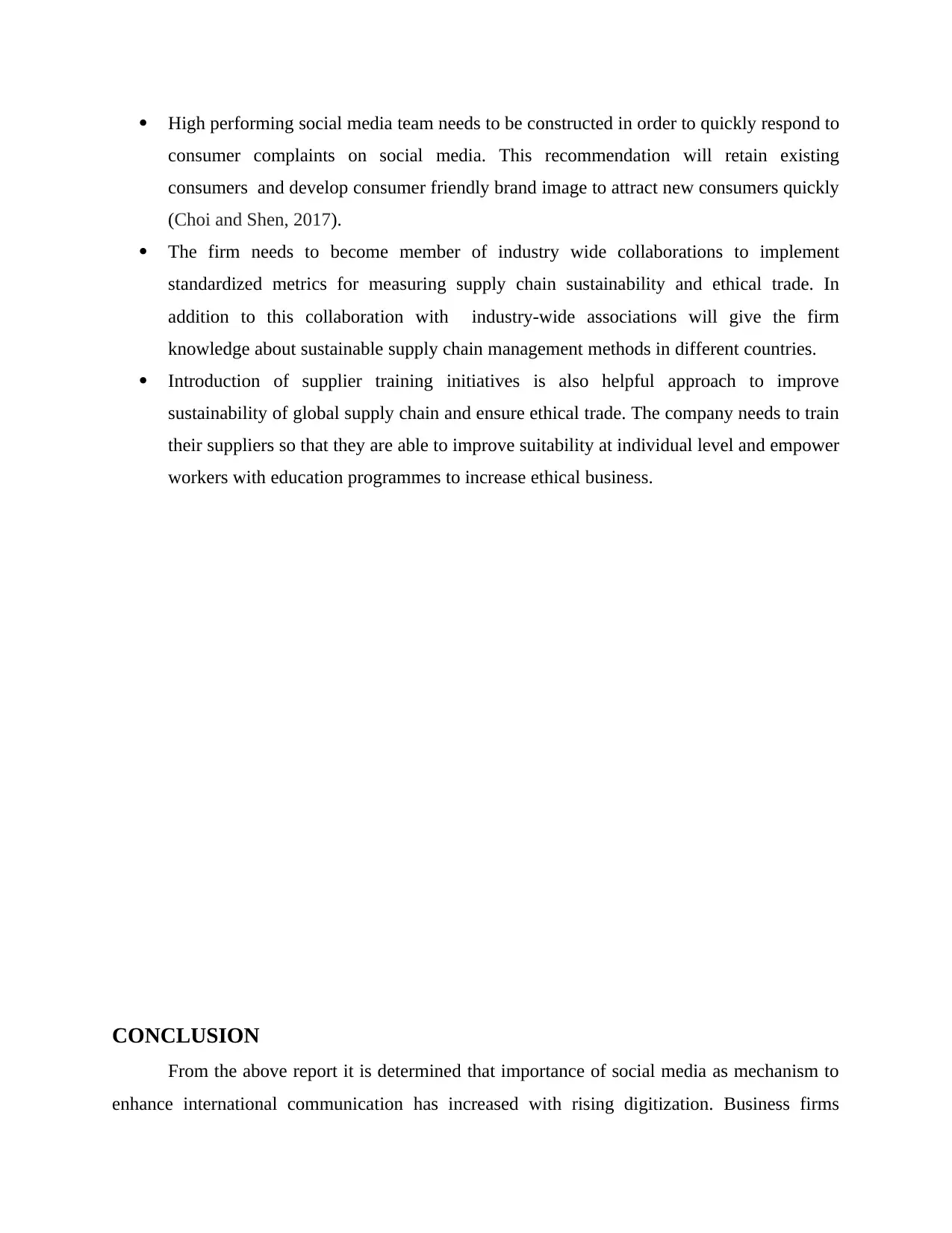
High performing social media team needs to be constructed in order to quickly respond to
consumer complaints on social media. This recommendation will retain existing
consumers and develop consumer friendly brand image to attract new consumers quickly
(Choi and Shen, 2017).
The firm needs to become member of industry wide collaborations to implement
standardized metrics for measuring supply chain sustainability and ethical trade. In
addition to this collaboration with industry-wide associations will give the firm
knowledge about sustainable supply chain management methods in different countries.
Introduction of supplier training initiatives is also helpful approach to improve
sustainability of global supply chain and ensure ethical trade. The company needs to train
their suppliers so that they are able to improve suitability at individual level and empower
workers with education programmes to increase ethical business.
CONCLUSION
From the above report it is determined that importance of social media as mechanism to
enhance international communication has increased with rising digitization. Business firms
consumer complaints on social media. This recommendation will retain existing
consumers and develop consumer friendly brand image to attract new consumers quickly
(Choi and Shen, 2017).
The firm needs to become member of industry wide collaborations to implement
standardized metrics for measuring supply chain sustainability and ethical trade. In
addition to this collaboration with industry-wide associations will give the firm
knowledge about sustainable supply chain management methods in different countries.
Introduction of supplier training initiatives is also helpful approach to improve
sustainability of global supply chain and ensure ethical trade. The company needs to train
their suppliers so that they are able to improve suitability at individual level and empower
workers with education programmes to increase ethical business.
CONCLUSION
From the above report it is determined that importance of social media as mechanism to
enhance international communication has increased with rising digitization. Business firms
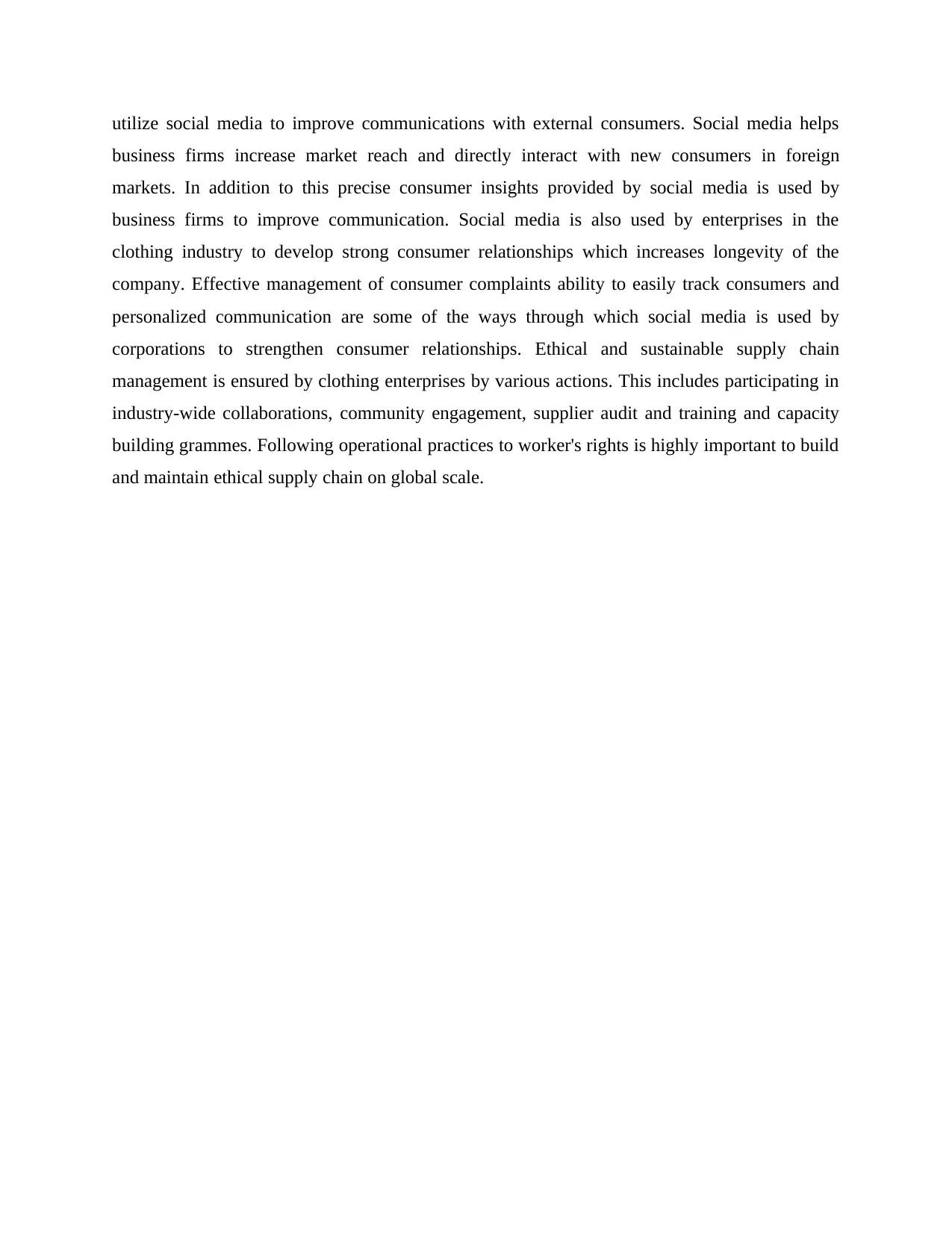
utilize social media to improve communications with external consumers. Social media helps
business firms increase market reach and directly interact with new consumers in foreign
markets. In addition to this precise consumer insights provided by social media is used by
business firms to improve communication. Social media is also used by enterprises in the
clothing industry to develop strong consumer relationships which increases longevity of the
company. Effective management of consumer complaints ability to easily track consumers and
personalized communication are some of the ways through which social media is used by
corporations to strengthen consumer relationships. Ethical and sustainable supply chain
management is ensured by clothing enterprises by various actions. This includes participating in
industry-wide collaborations, community engagement, supplier audit and training and capacity
building grammes. Following operational practices to worker's rights is highly important to build
and maintain ethical supply chain on global scale.
business firms increase market reach and directly interact with new consumers in foreign
markets. In addition to this precise consumer insights provided by social media is used by
business firms to improve communication. Social media is also used by enterprises in the
clothing industry to develop strong consumer relationships which increases longevity of the
company. Effective management of consumer complaints ability to easily track consumers and
personalized communication are some of the ways through which social media is used by
corporations to strengthen consumer relationships. Ethical and sustainable supply chain
management is ensured by clothing enterprises by various actions. This includes participating in
industry-wide collaborations, community engagement, supplier audit and training and capacity
building grammes. Following operational practices to worker's rights is highly important to build
and maintain ethical supply chain on global scale.
⊘ This is a preview!⊘
Do you want full access?
Subscribe today to unlock all pages.

Trusted by 1+ million students worldwide
1 out of 14
Related Documents
Your All-in-One AI-Powered Toolkit for Academic Success.
+13062052269
info@desklib.com
Available 24*7 on WhatsApp / Email
![[object Object]](/_next/static/media/star-bottom.7253800d.svg)
Unlock your academic potential
Copyright © 2020–2026 A2Z Services. All Rights Reserved. Developed and managed by ZUCOL.





